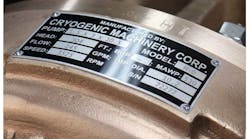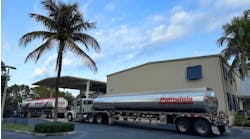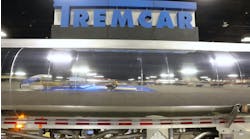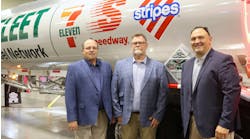BeyondTrucks expands integration hub
PSG acquires cryogenic pump manufacturer
Being in the right place can be critical to success for many companies. For US Container Depot LLC, the right place is the US eastern seaboard.
A division of Liquid Cargo Group Inc, US Container Depot has developed full-service tank container depots in Newark, New Jersey; Savannah, Georgia; and Jacksonville, Florida. Total storage capacity for the three locations approaches 2,000 tank containers.
“We believe focusing on the Atlantic coast of the United States puts us in the heart of the international tank container traffic involving the US market,” says Kevin Jackson, president of US Container Depot and Liquid Cargo Group. “We see increased demand for tank container depots in this region. US companies are learning how to make better use of ISO tank containers in international and domestic operations.
“The tank container industry has been growing steadily, and 2018 was a record year. While 2019 has been flat, it was at a high level. 2020 should be another strong year with tank container owners and operators adding more equipment to their fleets.
“We’re on the hunt for additional locations where it makes good business sense. We realize that we have to be smart when choosing a new location. The biggest risk is in miscalculating the potential for tank container business activity. Smaller ports simply can’t support very many depot locations. We also have to look carefully at the amount of infrastructure that will be needed to support a move into a new market.”
Modest beginning
The operation that grew into US Container Depot started very modestly in 2008. At the time, Kevin’s father (Mark) saw ISO tank container drayage as a way to expand the transportation options at Liquid Cargo, a New Jersey-based tank truck carrier that handled a variety of liquid bulk cargoes.
Kevin had joined the company in 2010 after working in other businesses for many years. He immediately recognized the potential future growth opportunities offered by the ISO tank container sector. In particular, he felt that full-service depots were the way to go.
By July 2010, the company had launched tank container drayage services in Savannah at the request of a customer. The company’s first depot was opened in Newark in 2013, a 3.5-acre site at 21 Hyatt Ave. Services included loaded and empty storage and steam heat capabilities for up to 10 tanks at a time.
In Savannah, US Container Depot opened its full-service facility in 2014 at a 4-acre site at 42 Sonny Purdue Dr. The depot can accommodate in excess of 450 tank containers. Services include tank container testing and inspections, heating and temperature monitoring, and minor maintenance and repair. Tank cleaning is provided directly across the street at one of Quala’s largest locations.
Growth track
Growth in US Container Depot’s operation really accelerated in 2018 and 2019. Over that two-year period, the company launched drayage service and opened a full-service tank container depot at Southern Tank Services, a wash rack operator at 1160 East Port Rd in Jacksonville.
“We’re leasing 2 of the 10 acres at the Southern Tank Services location in Jacksonville,” Kevin says. “By 2020, we’ll be able to store up to 400 tanks. We have heating and temperature monitoring. Tank cleaning is handled by Southern Tank Services, and a third-party provides minor maintenance and repair.”
US Container Depot also opened a second location in Newark during 2019. The company invested $300,000 to renovate and upgrade the former tank fleet terminal and wash rack at 62 Joseph St. The 2-acre property includes a two-bay wash rack and a three-bay shop. The wash rack is being operated in partnership with Extreme Tank Cleaning.
“Whether private or commercial, there have not been enough tank wash facilities in northern New Jersey for years,” Kevin says. “The added capacity, along with the high-pressure wash system to reduce cleaning time, should significantly improve the turn times for tank containers and tank trailers.
“We partnered with an experienced and qualified service provider in Extreme Tank Cleaning. Joe Bamber, owner of Extreme Tank Cleaning, brings over 10 years of experience in the tank cleaning industry—and the necessary supervision to ensure the high-level quality and service we are known for.”
The three-bay shop provides covered area for tank container prep and maintenance. The new depot location has room to store approximately 300 empty tank containers in the yard. Loaded tank containers are now stored at US Container Depot’s Hyatt Ave location in Newark.
Corporate change
Another critical change that occurred in 2019 was the decision to restructure Liquid Cargo Group Inc, turning each operating unit into a free-standing entity. US Container Depot and Liquid Cargo work independently of each other.
“We did this to allow each entity to establish its own unique identity in the United States and not have to share billing with one another,” Kevin says. “It allows for me to better position either entity for strategic growth opportunities in the future.
“Performance tracking of each company is no longer co-mingled and we are able to measure how strong each industry is and how we are performing in each industry.
“The equipment needs for each company are vastly different. Tractors need different equipment, trailers are different, and yard equipment is unique.”
Today, each operating unit looks for the growth opportunities that offer the best fit. For Liquid Cargo that has meant moving its focus westward. The tank truck carrier runs roughly 40 trucks hauling a wide range of liquid bulk cargoes. While the carrier still serves East Coast locations, the growing focus is on the corridor extending from Chicago, Illinois, to Houston, Texas. Most of the Liquid Cargo fleet is based at terminals in those two locations.
US Container Depot, on the other hand, is solidly rooted along the East Coast. In addition to plans for expanding the current facilities as needed, the company is looking at expansion opportunities that make good strategic sense.
Centralized planning and dispatch for US Container Depot are directed from the company’s Logistics Center in West Palm Beach, Florida. Liquid Cargo Inc, on the other hand, still manages its dispatch and planning at the individual terminal locations. Port moves are coordinated locally by the tank container depots, and all other loads are handled through the central dispatch and are tracked on a shared dispatch dashboard. The logistics center coordinates all plant pick-up and delivery schedules. Administrative and billing services also are handled out of the main office.
Depot equipment
All of the tank container depots have been outfitted with state-of-the-art technology and equipment. US Container Depot has invested in depot facility software with 3-D mapping capabilities for tracking every container on site. Three of the five loaded reachstacker lifts were added in 2019. Container handling equipment includes three loaded fixed-mast lifts. Four lifts are at the depots in Newark, three are in Savannah, and one is operating in Jacksonville.
All new dropframe tank container chassis were purchased in 2018. Purchased through TransWorld Equipment Corporation, the newest of the 120 chassis in the fleet were built by CIMC. The chassis have a pneumatic lift at the front for better product flow during unloading. The chassis have a 7,400-lb tare weight and a 109-inch axle spread. Specifications include PSI tire inflation, WABCO brakes, and Truck-Lite lighting with a Phillips wiring harness.
Company tractors account for about two-thirds of the 40 trucks in the US Container Depot fleet. The newest company tractors in the fleet are solid black Mack Anthems. The carrier runs daycab and sleeper tractors.
The newest Mack Anthems were spec’d with Mack’s MP-8 engine rated at 445 horsepower and Mack’s mDrive automated transmission. Safety technology includes the Bendix Fusion system with collision avoidance, adaptive cruise control, and lane departure warning.
Drivers typically serve customers within a 250-mile radius of the depot, with occasional shipment moving out to around 500 miles. “The short- to medium-haul activity keeps our fleet moving for maximum productivity,” Kevin says.








